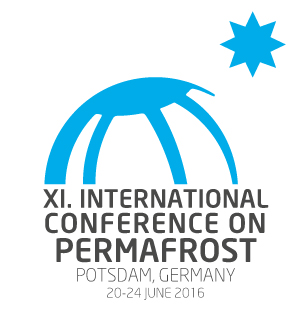Permafrost Conference in Potsdam, Germany

XI. International Conference on Permafrost
From 20 to 24 June 2016, scientists will discuss the changing permafrost regions
The Arctic permafrost regions are among the regions in the world where the consequences of climate change can be felt most strongly. At the 11th International Permafrost Conference (ICOP 2016) from 20 to 24 June 2016 hosted in the Congress Hotel in Potsdam (Germany), more than 600 permafrost experts from around the world will discuss how far the changes have progressed and what new methods scientists have at their disposal to better document and predict the change.
Interested journalists are invited to attend the conference to report and to conduct background interviews with leading scientists and engineers from Russia, the USA, Canada, China, Scandinavia and Germany. The scientific discussion will focus on the following key questions:
• How quickly is the permafrost melting and what are the factors that determine its speed? Findings from the new permafrost temperature measurement network.
• The carbon bomb fairytale: How quickly do microorganisms really break down animal and plant remains stored in the ground ice – and how much methane and carbon dioxide is released in the process?
• Life on the permafrost: How do buildings, bridges and other infrastructure have to be constructed in order to remain stable despite the melting permafrost?
The International Permafrost Conference takes place every four years. The joint organisers of the 11th specialist conference are the Alfred Wegener Institute, Helmholtz Centre for Polar and Marine Research (AWI) in Potsdam, the University of Potsdam, UP Transfer GmbH and the International Permafrost Association (IPA).
For advance or on-site media inquiries, please contact Sina Löschke from the AWI press team (tel.: +49 (0)471 48 31- 2008; mobile: +49 (0)179-133 59 30; e-mail: medien(at)awi.de). We would also be happy to organise an interview with international conference participants for you; in such case, please register your interview request at least six hours in advance.
For information about the conference programme, please visit the event website at http://www.icop2016.org. Background facts about the topic of permafrost are available at http://www.awi.de/en/focus/permafrost.html . During the conference, you will find us at the AWI booth outside the large lecture hall of the conference hotel.
Daily reports, interviews and videos will be made available throughout the course of the conference on the social media channels of the conference (http://www.icop2016.org). These contents will be created in close collaboration with students of the DEKRA University for Media Studies and the Helmholtz Climate Initiative REKLIM (http://www.reklim.de/en.html).
The Alfred Wegener Institute, Helmholtz Centre for Polar and Marine Research (AWI) conducts research in the Arctic, Antarctic and oceans of the high and mid-latitudes. It coordinates polar research in Germany and provides major infrastructure to the international scientific community, such as the research icebreaker Polarstern and stations in the Arctic and Antarctica. The Alfred Wegener Institute is one of the 18 research centres of the Helmholtz Association, the largest scientific organisation in Germany.
Media Contact
All latest news from the category: Event News
Newest articles

Machine learning algorithm reveals long-theorized glass phase in crystal
Scientists have found evidence of an elusive, glassy phase of matter that emerges when a crystal’s perfect internal pattern is disrupted. X-ray technology and machine learning converge to shed light…

Mapping plant functional diversity from space
HKU ecologists revolutionize ecosystem monitoring with novel field-satellite integration. An international team of researchers, led by Professor Jin WU from the School of Biological Sciences at The University of Hong…

Inverters with constant full load capability
…enable an increase in the performance of electric drives. Overheating components significantly limit the performance of drivetrains in electric vehicles. Inverters in particular are subject to a high thermal load,…





















